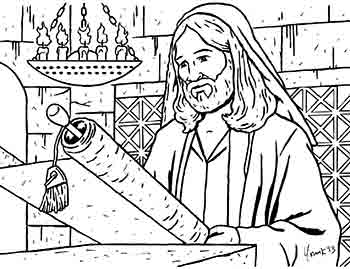Photo illustration by Phil Younk
Click on the photo for a printable PDF!
Jesus explains what God sent him to do
Based on the Readings: Neh 8:2-4a, 5-6, 8-10 and 1 Cor 12:12-30 and Lk 1:1-4; 4:14-21
“Your Words, Lord, are Spirit and life” (Psalm 19).
This Sunday’s three readings offer many truths for thoughtful meditation. The reading from Nehemiah illustrates God’s love for the Israelites by sending them a prophet/leader to bring them back to God’s law after they had drifted away from living God’s ways. First Corinthians stresses St. Paul’s admonitions to the Corinth community to use their Spirit-given gifts to share with and to meet the needs of others as members of the Body of Christ.
In the Gospel, Jesus, having begun to teach, goes back to his hometown of Nazareth. He goes to the synagogue and reads a passage from the book of Isaiah in the Hebrew Scriptures. The words had been written many years earlier and said the Messiah would come and do many great and wonderful things. These words were on a “scroll,” a large roll of paper. Jesus read:
“The Spirit of the Lord is upon me, because he has anointed me to bring glad tidings to the poor. He has sent me to proclaim liberty to captives and recovery of sight to the blind, to let the oppressed go free and to proclaim a year acceptable to the Lord.”
When Jesus finished reading, he handed the scroll back to the attendant, and sat down. All eyes were riveted on Jesus. He said to them, “Today this Scripture passage is fulfilled in your hearing.” In other words, Jesus is telling them he is the Messiah.
Prior to his return to Nazareth, Jesus was doing what the Scriptures described. He preached; he prayed over people – the sick were healed, the blind could see and the lame could walk. He taught people about God’s love. Jesus brought the Good News.
As he spoke to the people of Nazareth, they marveled at his preaching and appeal as a speaker. Jesus’ spoken words will begin to sink in.
As a boy growing up in Nazareth with Mary and Joseph, Jesus learned about the Hebrew Scriptures and all the prayer and traditions of his Jewish faith. As a young man, he read the Scriptures, studied them, prayed over them and went to the synagogue regularly.
Today’s Gospel doesn’t tell us what the people of Nazareth thought of Jesus when he indicated he was the Messiah. Their surprising reaction will be revealed in next Sunday’s Gospel.
Lord Jesus, help us to hear your words of life and to live them.

